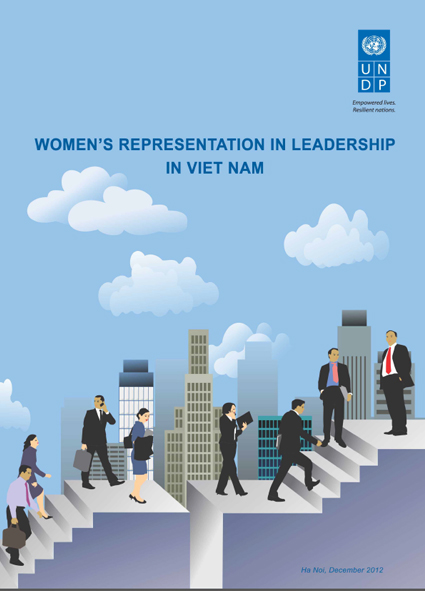Women’s Representation in Leadership in Viet Nam
The purpose of this report is to highlight trends in women’s representation in Viet Nam’s government, provide an overview of the legal framework related to women’s leadership and to discuss the challenges and barriers faced by women in the public sector. The report is a review and analysis of recent research findings and government reports related to women in decision making. The report highlights that although there has been considerable progress made by Viet Nam in promoting gender equality and women empowerment, there still remains a gap between the targets and expectations expressed in government legislation and in the actual figures of women’s representation.
Workplace attitudes are challenges for women in their aspiration to leadership positions. Female leaders are assessed more harshly than their male counterparts, and their promotion can be dependent on a supervisor who is unwilling to implement gender-sensitive regulations; while at home, women are expected to perform almost all domestic duties. There are few women role models for young women to follow or to be inspired by. Women themselves do not necessarily see themselves as leaders, in part because of messages expressed in media, education and home.
To address these factors and to support the government in building an effective and inclusive governing system, the following recommendations are made:
Policies and Programs:
- Consider removing the discriminatory practice of forcing women to retire 5 years earlier than men and at the pinnacle and most effective point in their career. Revise the labour code to ensure women and men have the same maximum and minimum retirement age.
- Consider removing age restrictions placed on women during hiring, promotion and nomination for training.
- Implement specific hiring, training, promotion policies to have a minimum of 30% women in deputy director and director positions in government (both department and division) and the Party. More importantly, put in place strict punitive measures if these targets are not met.
- Implement an award system to recognize departments that introduce progressive employment and human resource practices that result in an increase in women’s representation in deputy and director level positions.
- Implement training and mentoring programs for women in junior positions to prepare them for advancement and to be effective in senior level positions.
- Conduct studies and begin conversations about the introduction of a parental or paternity leave to show government support for men to play a larger role in child care and to support their spouses in pursuit of careers.
- Implement training programs within established institutions (schools, universities, academies) that give preference to women students and that provide soft skills such as public speaking, debating, arguing, speaking with constituents, policy writing, action plan development and inform women of candidate selection and nomination processes.
Attitudinal Change:
- Implement awareness raising campaigns targeted at senior official of the Party and government arguing the importance and effectiveness of having an equal level of women in senior decision making positions and suggesting best practices for increasing the number of women in senior level positions.
- Implement awareness raising and behaviour change campaigns targeted at men in the public service on the role men need to play in the home to allow and support women to pursue and be successful in their careers and how male colleagues can mentor, support and promote their female colleagues.
- Carry out innovative awareness raising campaigns focused at the general public by showcasing prominent women leaders in Viet Nam and Asia.
- Support media to work more with current women leaders, to bring forward women’s views in present debates and issues and encourage media to seek out women’s views on issues and represent these fairly and equally.
- Implement young women’s leadership training courses in high-schools and universities to engage women at a young age and to encourage them and provide them the necessary knowledge, skills and confidence to become leaders.
- Work with youth to engage them on gender equality, rights of women, roles of men in child care and home management and roles of women as leaders in the workplace and community.
---------------------------------
1 UNDP (2011), Social services for human development: Viet Nam Human Development Report
Full text of Women’s Representation in Leadership in Viet Nam: womenrepinleadershipinvnen2.pdf
 |
- Hôm nay 505
- Tổng lượt truy cập 6,864,685


Bình luận từ Facebook
Phản hồi